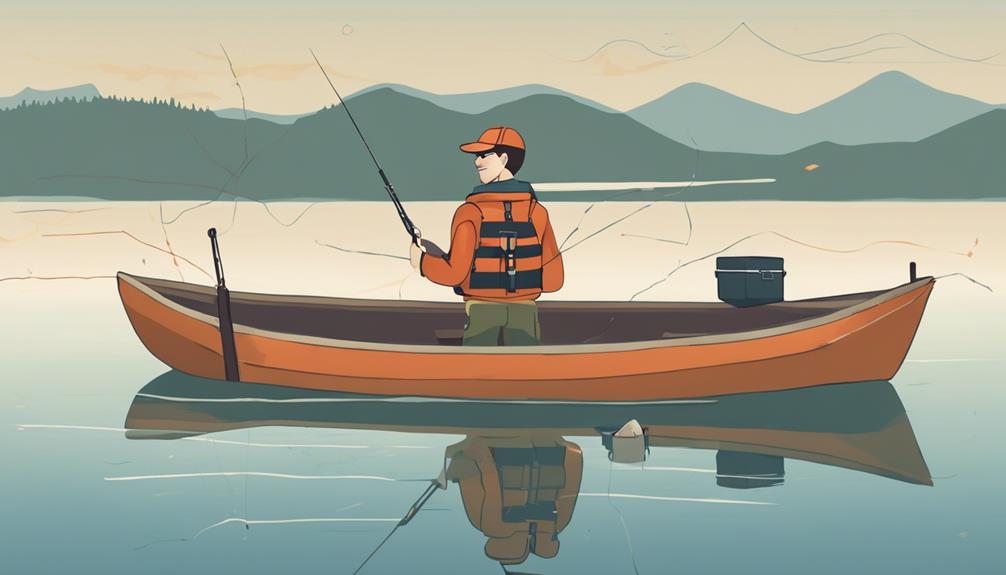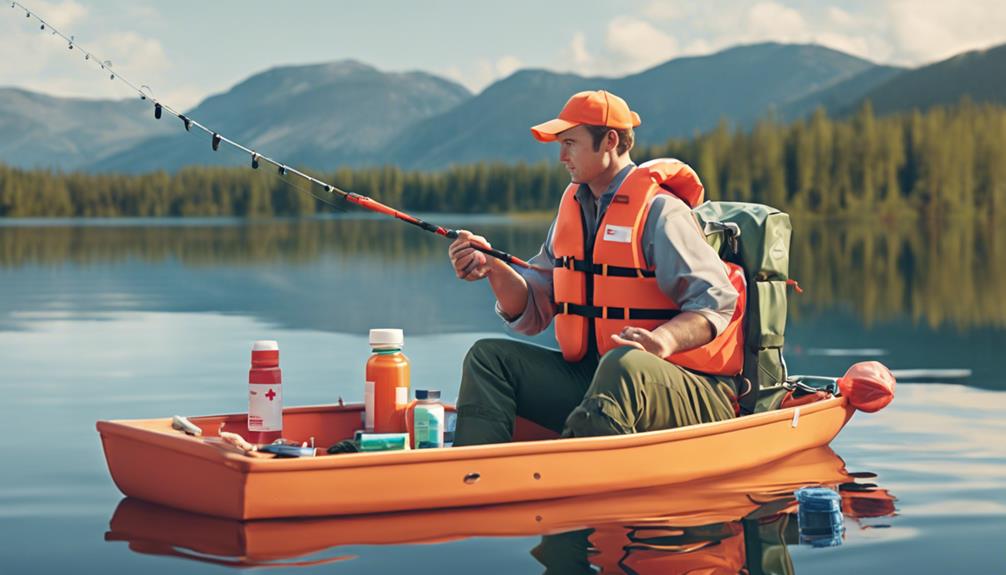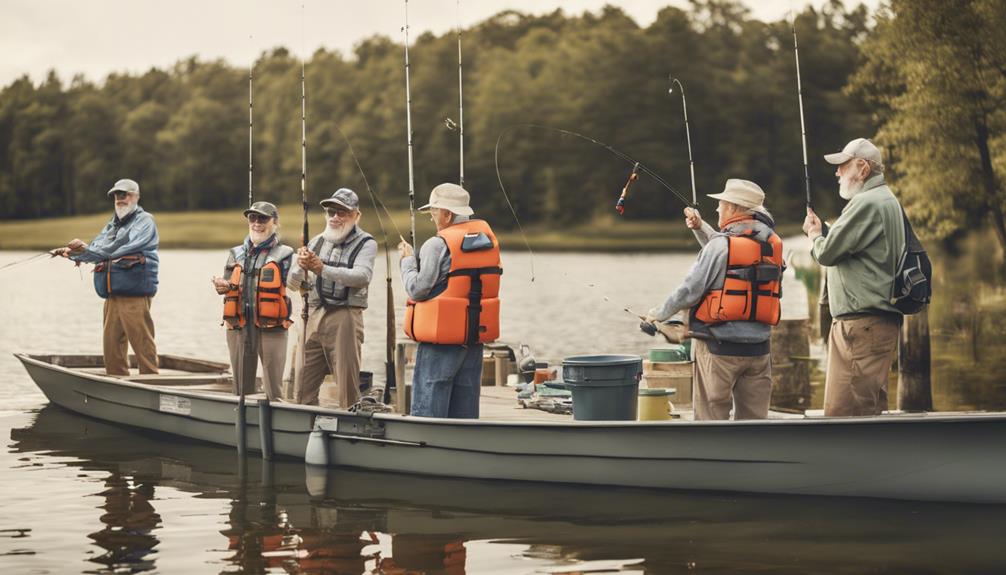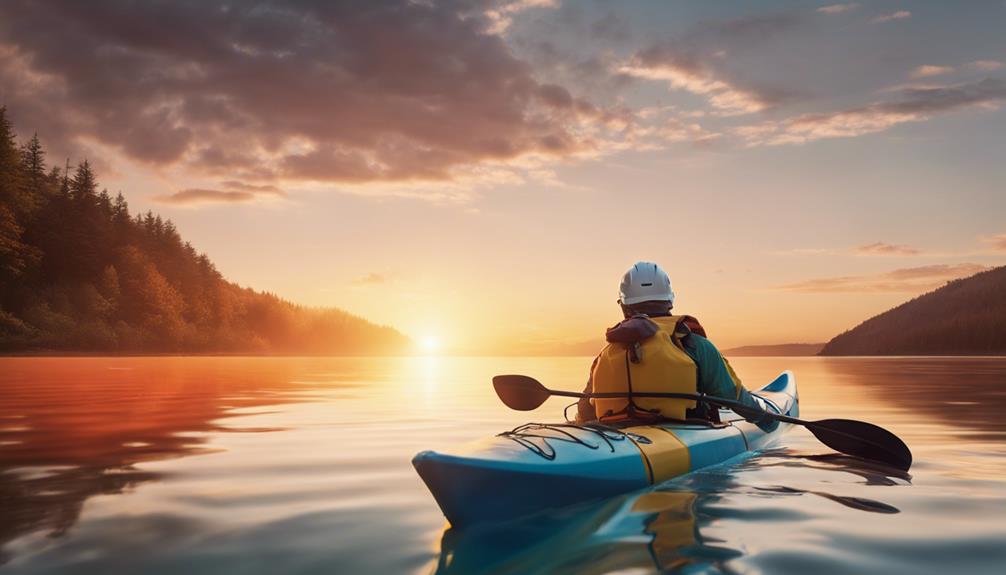When considering embarking on solo fishing trips, you might be concerned about the potential risks and challenges that come with being alone on the water. However, with the right preparation and mindset, you can confidently navigate these journeys while ensuring your safety remains a top priority.
By following a few key strategies and equipping yourself with essential knowledge and gear, you'll be well-equipped to handle any unexpected situations that may arise.
So, let's dive into the essential tips that will help you enjoy your solo fishing adventures with peace of mind.
Essential Gear Checklist
When embarking on solo fishing trips, ensure you have a comprehensive essential gear checklist to guarantee a safe and successful outing. Tackle organization plays a crucial role in your fishing experience. Having your gear neatly arranged and easily accessible can save you time and frustration on the water. Make sure your tackle box is stocked with a variety of hooks, sinkers, lures, and lines to accommodate different fishing techniques you may use during your trip.
Proper tackle organization also means having the right tools for the job. Pack a pair of sharp scissors or pliers to quickly cut lines or remove hooks. A multitool can be handy for various tasks. These tools can enhance your fishing experience and make it easier to adapt to different situations you may encounter.
When it comes to fishing techniques, being prepared is key. Research the type of fish you're targeting and learn about the best techniques to catch them. Whether it's fly fishing, trolling, or bottom fishing, having a good understanding of the techniques will increase your chances of success. Additionally, having a variety of bait options can be beneficial as different fish species may respond better to specific types of bait.
Weather Awareness
Stay vigilant about changing weather conditions to ensure your safety and success during solo fishing trips. Weather awareness is crucial for a smooth fishing experience. Keep an eye on weather forecasts before heading out and pay attention to any sudden changes while you're on the water. Sudden storms can pose serious risks, so it's essential to be prepared.
Gear maintenance is also key when it comes to weather awareness. Make sure your equipment, especially your safety gear like life jackets and emergency supplies, is in good condition before embarking on your fishing trip. In case the weather takes a turn for the worse, having well-maintained gear can make a significant difference in your safety.
Navigation skills play a vital role in responding to changing weather conditions. If you notice dark clouds rolling in or sudden shifts in wind patterns, being able to navigate back to shore efficiently is crucial. Familiarize yourself with the area you're fishing in and have a backup plan in case you need to make a quick exit due to weather concerns.
Emergency Communication Plan
Maintaining clear lines of communication is essential for ensuring your safety during solo fishing trips, especially in the face of unexpected emergencies. Before heading out, always share your itinerary with an emergency contact, detailing where you plan to fish and when you expect to return. This information is crucial in case you fail to check-in at the designated time. Make sure your emergency contact knows who to call for help if needed.
When it comes to communication devices, consider carrying a fully charged mobile phone in a waterproof case. In areas with spotty reception, a satellite phone or a personal locator beacon (PLB) can be lifesaving. These devices can send distress signals with your exact location to emergency responders, even in remote areas. Additionally, a whistle or a signaling mirror can be useful in attracting attention if you're stranded or in need of help.
Regularly check the battery life of your communication devices and ensure they're in working condition before each trip. It's also advisable to keep them in a secure and easily accessible spot, like a pocket or a waterproof pouch attached to your clothing. By having a solid emergency communication plan in place and reliable devices on hand, you can better prepare yourself for any unforeseen circumstances while enjoying your solo fishing adventures.
Safety Precautions on Watercraft
Prioritize your safety on watercraft by adhering to essential safety precautions while out fishing solo. To ensure a safe and enjoyable fishing trip, make sure to follow these key safety measures:
- Watercraft Maintenance: Regularly inspect your watercraft for any signs of wear and tear. Check for leaks, ensure all equipment is functioning properly, and carry out any necessary repairs before heading out on the water. Proper maintenance can prevent breakdowns and accidents while you're fishing solo.
- Navigation Skills: Improve your navigation skills by familiarizing yourself with the water body you'll be fishing in. Study maps, learn about any potential hazards or shallow areas, and always carry a GPS or compass with you. Being able to navigate effectively will help you avoid getting lost or stranded while out on your solo fishing trip.
- Life Jacket: Always wear a properly fitted and Coast Guard-approved life jacket while on your watercraft. In case of an emergency or if you accidentally fall overboard, a life jacket can be a lifesaver, especially when fishing alone.
- Emergency Supplies: Pack essential emergency supplies such as a whistle, flashlight, first aid kit, and extra food and water. These supplies can come in handy in unexpected situations and ensure you're prepared for any unforeseen circumstances while out on the water.
First Aid Kit Must-Haves
To ensure your safety while out on solo fishing trips, having a well-equipped first aid kit is crucial for handling any emergencies that may arise. When assembling your first aid kit, consider including essentials like bandages, antiseptic wipes, gauze pads, adhesive tape, and tweezers for removing splinters or small hooks. Additionally, it's important to pack medications such as pain relievers, antihistamines for allergic reactions, and any personal medications you may need.
Insect repellent is a must-have item to protect yourself from pesky bugs while fishing. Look for a repellent that contains DEET or picaridin to effectively ward off mosquitoes, flies, and ticks. Sunscreen protection is also vital to prevent sunburns, especially when spending long hours out on the water. Choose a broad-spectrum sunscreen with an SPF of 30 or higher and remember to reapply it every few hours, especially after sweating or swimming.
Including emergency contact information, a small first aid manual, and some basic survival items like a whistle and emergency blanket can also be valuable additions to your kit. Before heading out on your solo fishing adventure, familiarize yourself with how to use the items in your first aid kit so that you can respond quickly and effectively in case of any mishaps.
Understanding Local Regulations
Make sure to familiarize yourself with the local regulations before embarking on your solo fishing trip. Understanding the rules and guidelines in the area you plan to fish is crucial to ensure a safe and enjoyable experience. Here are some key aspects to consider:
- Permit requirements: Before you start fishing, check if you need any permits or licenses to fish legally in the area. Violating permit requirements can lead to fines or penalties, so make sure you have all the necessary paperwork in order.
- Conservation zones: Be aware of any conservation zones in the area that may have specific rules regarding fishing activities. These zones are designed to protect wildlife and habitats, so it's essential to respect these regulations to help preserve the ecosystem.
- Catch limits: Different areas have varying catch limits to prevent overfishing and maintain healthy fish populations. Knowing the catch limits will help you fish responsibly and contribute to the conservation efforts in the region.
- Protected species: Familiarize yourself with any species that are protected or endangered in the area. It's crucial to handle these species with care and release them properly if caught accidentally to help preserve their populations.
Wilderness Survival Tips
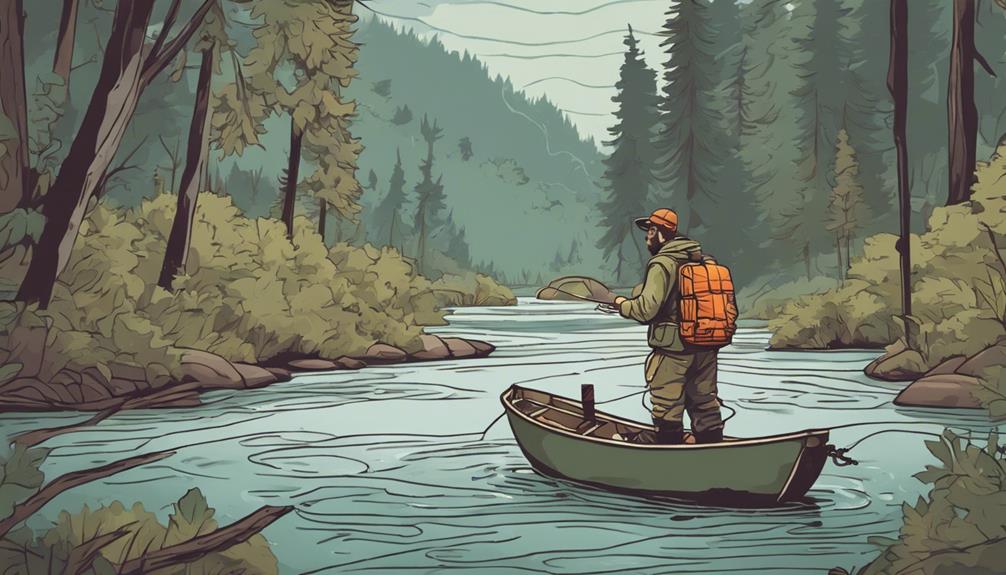
Ensure your safety in the wilderness by equipping yourself with essential survival tips for your solo fishing adventure. When heading out on a solo fishing trip, it's crucial to be prepared for any unexpected situations that may arise.
One key skill to have is shelter building. Knowing how to construct a simple shelter using natural materials can protect you from the elements and keep you warm during the night. Look for sturdy branches, leaves, and other debris to create a basic shelter that will provide you with a safe place to rest.
In addition to shelter building, familiarize yourself with edible plants in the area where you'll be fishing. Having knowledge of which plants are safe to eat can be a lifesaver if your food supply runs out or you find yourself in a survival situation. Research common edible plants in the region and learn how to identify them correctly. However, always be cautious when foraging for wild plants, as some may be poisonous.
Return and Check-In Protocol
When planning your return from a solo fishing trip, establishing a check-in protocol with a trusted contact is essential for your safety. Here are some key points to consider:
- Check in buddies: Choose reliable individuals as your check-in buddies. These should be people who can raise the alarm if you fail to check in as planned. Make sure they understand the importance of this task and have the necessary contact information.
- Return timeframes: Clearly communicate your expected return timeframes with your check-in buddies. Provide them with a detailed itinerary of your fishing trip, including departure and return times. This information will be crucial in case of an emergency.
- Emergency procedures: Establish clear emergency procedures with your check-in buddies. Define what actions they should take if you don't check in within the specified timeframe. Make sure they know who to contact, such as local authorities or search and rescue teams.
- Communication methods: Determine the preferred method of communication for checking in. Whether it's a phone call, text message, or email, ensure that it's a reliable way to stay in touch with your check-in buddies.
Frequently Asked Questions
What Are Some Tips for Staying Focused and Alert During Long Hours of Solo Fishing?
To stay focused and alert during long solo fishing hours, try mindfulness practices and focus techniques. Keep energy up with snacks and stay hydrated.
Stay engaged with your surroundings and take short breaks to prevent fatigue. By incorporating these strategies, you can maintain your attention and ensure a successful fishing trip.
How Can I Prevent and Treat Common Fishing-Related Injuries, Such as Hook Wounds or Fish Bites?
To prevent and treat common fishing-related injuries like hook wounds or fish bites, it's crucial to have first aid knowledge and safety gear.
Keep a well-stocked first aid kit with you at all times. Use pliers to safely remove hooks. Treat wounds promptly to prevent infection.
Wear protective gloves and clothing to minimize the risk of bites. Prioritize safety and be prepared for any injuries that may occur while you're out fishing solo.
Are There Any Specific Techniques for Handling and Releasing Fish Safely While Fishing Solo?
When handling fish solo, prioritize their well-being. Use wet hands to touch them gently and avoid harming their protective slime layer.
Hold fish horizontally to support their body properly. Be mindful of the fish's size and health when releasing it back into the water.
Practicing catch and release with care demonstrates good conservation ethics. Keep the fish in the water until it's ready to swim away on its own, ensuring a safe release.
What Measures Can I Take to Protect Myself From Wildlife Encounters While Out on the Water?
When out on the water, you can protect yourself from wildlife encounters by making noise to avoid surprising animals, keeping food stored away, and knowing local wildlife behaviors. Prevention tactics include carrying bear spray or a whistle for emergencies.
For water safety, always wear a life jacket and let someone know your plans before heading out. Have emergency protocols in place, like a first aid kit, and be aware of your surroundings at all times.
How Should I Approach and Handle Potentially Dangerous Weather Conditions While on a Solo Fishing Trip?
When facing dangerous weather conditions during solo fishing trips, prioritize safety by keeping a close eye on the forecast. Develop strong navigation skills to avoid getting caught off guard.
Always conduct a thorough risk assessment before heading out and ensure you have the necessary survival gear on hand. Stay prepared with reliable emergency communication methods in case you need assistance.
Your safety should always come first when dealing with potentially hazardous weather while fishing alone.
Conclusion
Now that you have all the necessary gear and knowledge to stay safe on solo fishing trips, remember to always prioritize your safety. Stay informed about weather conditions, have a communication plan in place, and follow safety precautions on your watercraft.
Don't forget to bring a first aid kit and familiarize yourself with local regulations. By taking these precautions and being prepared, you can enjoy your fishing trips with peace of mind.
